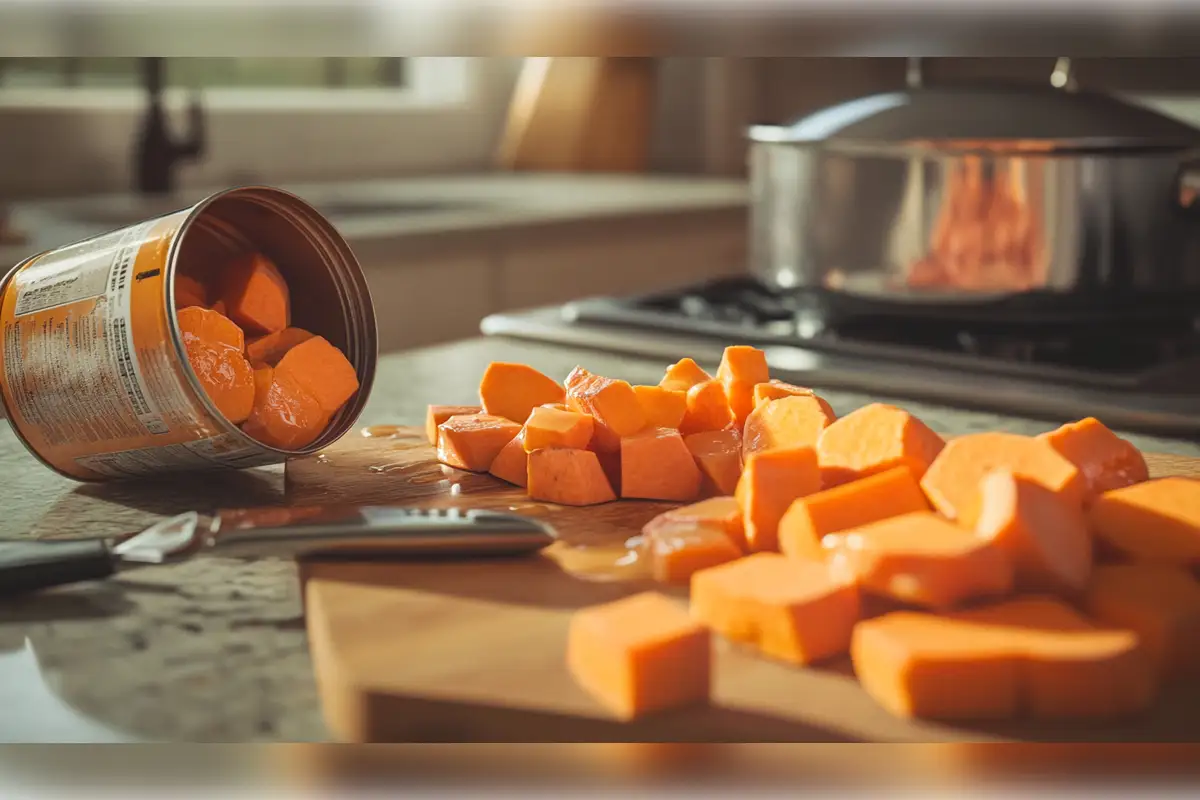When it comes to preparing canned yams, a common question that arises is Should I rinse canned yams? Whether you’re making a delicious casserole or simply adding them to a side dish, knowing whether to rinse them can impact the final taste and texture of your dish. In this guide, we’ll explore the reasons for and against rinsing canned yams, as well as how to decide based on your recipe.
What Are Canned Yams?
Many home cooks find canned yams to be a convenient and popular option, especially during the holiday season. However, many people don’t realize that producers often label “yams” in the U.S. as sweet potatoes. These root vegetables come pre-cooked and soft, making them easy to use in dishes like pies, casseroles, or even as simple side dishes. Manufacturers typically pack them in either water or syrup for added convenience.
Whether you’re aiming for a savory or sweet dish, canned yams save time in preparation. You might even be interested in trying them in a traditional holiday favorite like this Sweet Potato Casserole with Canned Yams for a delightful and quick recipe.
Why Do People Rinse Canned Yams?
Many cooks wonder whether rinsing canned yams is necessary, especially when preparing dishes that require precise flavor control. The reason people consider rinsing canned vegetables, including yams, is to remove excess syrup, starch, or any preservatives used in the canning process.
When yams are canned in syrup, they tend to have a much sweeter taste. If you’re aiming for a savory dish, rinsing helps to wash away some of that sweetness, giving you more control over the final flavor. For example, in dishes like casseroles, pies, or even side dishes like mashed yams, removing the excess syrup can prevent the dish from becoming overly sweet.
On the other hand, if you’re using canned yams in a sweet dish such as a dessert, rinsing might not be necessary. Leaving the syrup intact adds a rich, sweet flavor that enhances the overall taste. You can learn more about using canned yams in various dishes by checking out this helpful resource on whether you should boil sweet potatoes before baking.
Do You Always Need to Rinse Canned Yams?
The need to rinse canned yams depends largely on the recipe you’re preparing. If the yams are packed in syrup and you’re making a savory dish, rinsing is a good idea. This helps to control the sweetness and allows the yams to absorb the seasonings in the dish more effectively.
In contrast, when making a dish where sweetness is desired, such as a sweet potato pie or a sweet casserole, you may prefer not to rinse. The syrup can add extra flavor and richness, making the dish more decadent. Keep in mind that while rinsing canned yams can reduce unwanted sugars, it might also wash away some of the flavors, so consider your recipe carefully.
In sweet potato casseroles, for instance, the decision to rinse or not could dramatically change the dish’s flavor profile. If you’re curious about this, you can explore more in the Should I Boil My Sweet Potatoes Before Baking guide, which delves into whether preparation methods like boiling and rinsing affect the final result.
How to Rinse Canned Yams Correctly
Rinsing canned yams may seem straightforward, but there are a few key steps to ensure you don’t lose flavor while removing excess syrup or preservatives. Here’s a simple guide on how to rinse canned yams properly:
- Drain the Can: Open the can of yams and pour the contents into a colander. Allow any liquid (water or syrup) to drain out completely.
- Use Cold Water: Run cold water over the yams while gently stirring them with a spoon or your hand. This helps to wash off the syrup or brine without damaging the soft texture of the yams.
- Pat Dry (Optional): If you want to reduce the moisture even further, especially if the recipe requires drier yams, you can gently pat them dry with a paper towel after rinsing. However, be cautious not to break the yams, as they are soft and easily fall apart.
By rinsing the yams this way, you can retain most of their flavor and ensure that excess syrup or sugar doesn’t interfere with your dish.
Canned Yams in Recipes: The Rinse vs. No-Rinse Debate
Whether or not to rinse canned yams can depend heavily on the type of dish you’re preparing. Let’s explore both sides of the debate:
- When to Rinse: If you’re making a savory dish such as a yam mash or adding yams as a side dish to a roast, rinsing can help balance the flavors, ensuring the yams don’t overpower the dish with sweetness. Removing the syrup allows the natural flavors to shine while giving you more control over seasoning.
- When Not to Rinse: For desserts or sweet dishes like candied yams or sweet potato pies, it’s often better not to rinse the yams. The syrup in which the yams are packed can add extra sweetness and moisture that’s desirable in such dishes.
FAQ
1. Should I rinse canned yams before baking?
Rinsing canned yams before baking is generally a good idea if you’re making a savory dish. This helps to remove excess sugars that might affect the taste and texture. However, if you’re baking a sweet dish like a casserole or pie, rinsing may not be necessary, as the syrup can add flavor.
2. Are canned yams already cooked?
Yes, canned yams are pre-cooked and ready to eat. This makes them an excellent choice for quick recipes where you want to cut down on preparation time. You can eat them straight from the can, use them in dishes without much additional cooking, or just heat them up.
3. What is the difference between sweet potatoes and yams?
In most cases, what you find labeled as “yams” in the U.S. are actually orange-fleshed sweet potatoes. True yams are a different type of root vegetable entirely, with a starchier and drier texture. However, the confusion persists due to historical labeling, particularly in canned goods.
4. Can I use canned yams in place of fresh yams?
Yes, canned yams can be used as a substitute for fresh yams in many recipes. Keep in mind that canned yams are softer and may have added syrup, so you may need to adjust the recipe’s sweetness and texture accordingly.
5. Should I drain canned yams for casseroles?
If you’re making a casserole, it’s often advisable to drain canned yams to control the moisture in the dish. If they are packed in syrup and you don’t want extra sweetness, consider both draining and rinsing them.
6. Can I use the syrup from canned yams in recipes?
Yes, the syrup from canned yams can be used in various recipes, especially sweet dishes. The syrup adds extra sweetness and flavor, making it perfect for desserts like pies, candied yams, or as a sweetener in sauces. If you prefer not to waste it, you can reduce the syrup by simmering it to concentrate the flavors further.
7. How long do canned yams last after opening?
After opening, store canned yams in an airtight container in the refrigerator and consume them within 3 to 4 days.. If you’re not using them immediately, you can freeze the yams for longer storage, but be aware that freezing may slightly alter the texture.
8. Are there any alternatives to canned yams if I don’t want to use them?
Yes, you can substitute fresh sweet potatoes for canned yams in most recipes. Simply peel, boil, and cook the sweet potatoes until soft before using them in your dish. However, fresh sweet potatoes require more preparation time than canned yams, so canned yams remain a quick and convenient option for many recipes.
Rinsing Canned Yams: Pros and Cons
Let’s break down the advantages and disadvantages of rinsing canned yams:
Pros:
- Reduces Sweetness: Rinsing removes the syrup that could make savory dishes too sweet.
- Controls Seasoning: Removing the syrup gives you more control over the seasoning and flavors you add to the dish.
Cons:
- Loss of Flavor: In some cases, rinsing may wash away some of the natural sweetness and flavor of the yams, which could be desirable in certain recipes.
- Texture: Excessive rinsing and handling can damage the soft texture of canned yams, making them too mushy for certain dishes.
Alternatives to Rinsing Canned Yams
If you prefer not to rinse your canned yams but still want to reduce sweetness, consider the following options:
- Drain but Don’t Rinse: Simply draining the syrup and using the yams as-is can reduce some sweetness without washing away too much flavor.
- Use in Sweet Dishes: Instead of rinsing, try using the yams in recipes that benefit from extra sweetness, like pies or candied yams.
- Balance Flavors: In savory dishes, you can balance the sweetness by adding more acidic or spicy ingredients, such as vinegar, mustard, or chili.
Conclusion
Whether or not you should rinse canned yams largely depends on the dish you are preparing. Rinsing can reduce unwanted sweetness and provide more control over flavor in savory recipes, while leaving the yams as they are can enhance sweet dishes. By considering your recipe’s requirements, you can make the best decision for a perfectly balanced dish.
Feel free to explore other preparation tips and tricks in Boil Sweet Potatoes Before Baking for more insights into cooking root vegetables.

